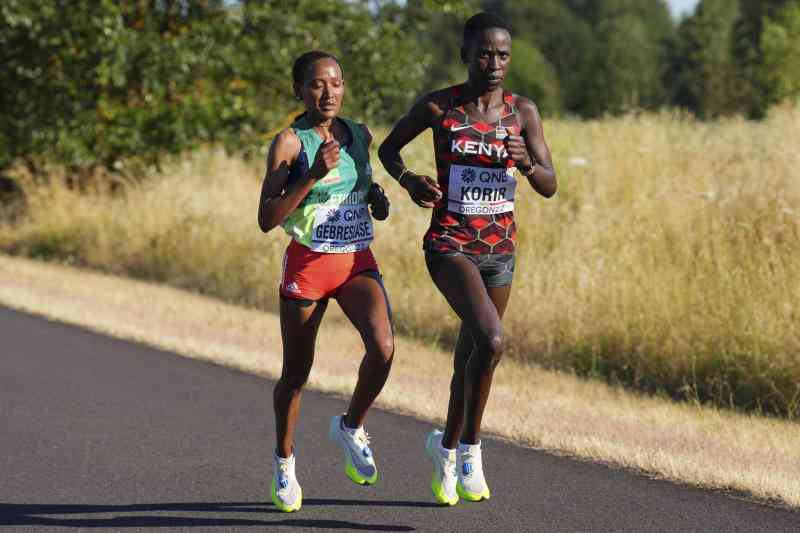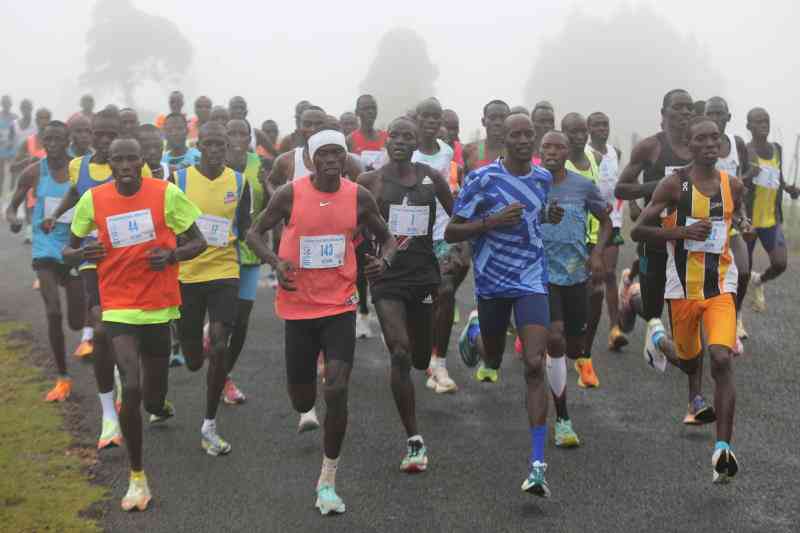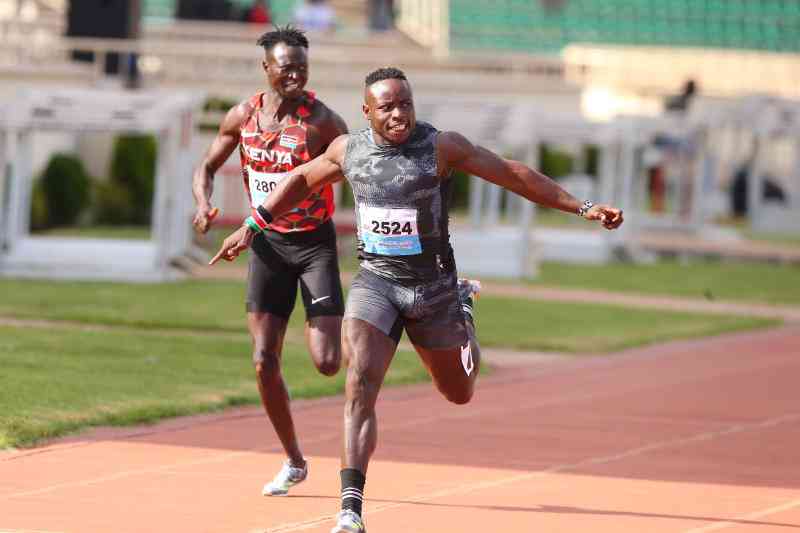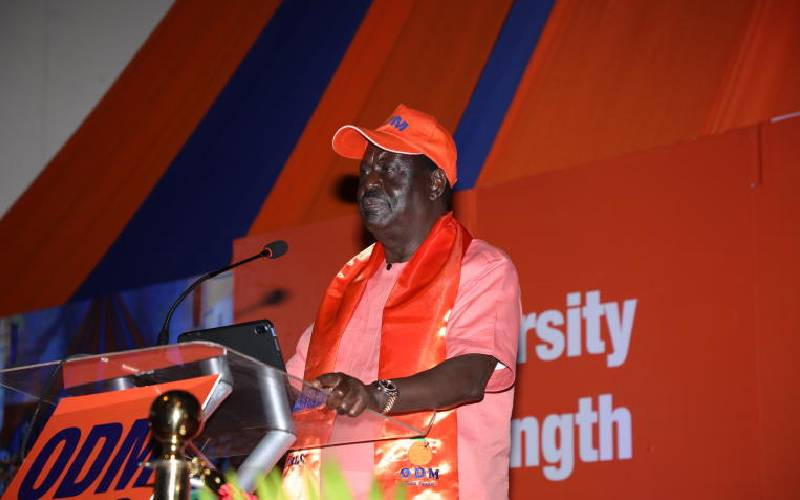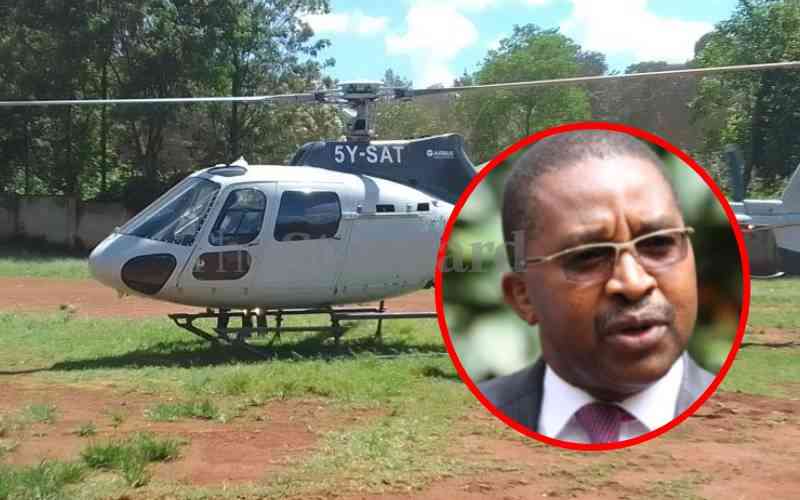The national athletics body Athletics Kenya is entangled in an intricate web of corrupt and shady deals putting the organisation’s top leadership on the spot.
Months-long Investigations by The Standard on Sunday have brought to the fore questionable transactions and cover up schemes involving money running into millions of dollars withdrawn by top AK officials for unspecified use.
Already, the Criminal Investigations Department is investigating AK top officials over allegations of pilfering the organisation’s coffers.
“We are examining all the documents. The transactions span years and we want to get to the bottom of this. It is massive,” said an officer privy to the ongoing probe.
Among those in the radar are AK’s President Isaiah Kiplagat, former Secretary General (now AK Vice President) David Okeyo and former Treasurer Joseph Kinyua who documents show on various dates between 2005 and 2010 withdrew huge sums of money from AK accounts.
The money was not declared in AK’s audited Financial Statement for the year ended December 31, 2010.
The detectives are investigating questionable monies remitted by AK’s sponsorship partner Nike which has a running contract with the athletics body.
“AK entered into a sponsorship partnership with Nike, a US-based sports agency in 2003. The contract, which would run until 2020, was renegotiated in 2005 and amended in 2010. It is this contract that the top management of AK has been manipulating for personal financial gain,” said a detective.
According to documents in our possession, Nike has been remitting money code-named “honorarium” into AK bank accounts since 2003.
Though Nike agent Mark Mastalir said in a mail to Kiplagat that honorarium is an annual payment that Nike pays to the federation in order to ensure that “certain federation members will provide certain services Nike considers critical”, it was followed immediately by another email that alluded to a coded kind of payment.
“The honorarium is an annual payment that Nike makes directly to the Federation in order to ensure that certain federation members will provide, and will have adequate funding for, certain services that Nike considers critical to maximising our value from the agreement and our investment...” reads part of the mail sent to Kiplagat on September 25, 2003.
However, Mastalir followed up this mail a day later with a suspicious connotation on what really the honorarium was.
“I wanted to give you a heads up that I will be faxing this letter to AK and to NOCK by tomorrow. I will do one specific to NOCK as well. We need to do this to protect Nike in case something happens in the future. It will by no means affect our agreement with you. We just need to have the document for our file to protect Nike,” reads the letter from Mastalir.
It is not clear why Kiplagat was being given a heads up yet AK, according to Mastalir, was going to get the mail anyway.
NO COMMENT
Stay informed. Subscribe to our newsletter
Kiplagat refused to comment on what the email meant and if it was a cover up for kickbacks the AK officials were getting disguised as genuine payment.
“I will not answer nonsense. Get it clear, I will not answer,” he said before disconnecting the phone.
In the documents in our possession, it shows that since 2003, Nike has been remitting $72,000 yearly (Sh6.4m) to AK as honorarium and which was varied in 2011 to $100,000 yearly.
On top of the questionable money received by the three top AK officials referred to as honorarium, the three AK executive members received another $500,000 (Sh44.5m) called “commitment bonus” from Nike.
In an email conversation on November 4, 2010, Kiplagat demanded the bonus from Nike through one Lotwis Robert and another man called John Capriotti, both employees of the agency.
“Dear Robert, US$500,000 being commitment Bonus,” wrote Kiplagat in a mail marked “URGENT”.
And in a swift response, which was mailed back the same day and copied to Capriotti, Robert responded in one line “Got it. I will submit right away. Thanks.”
And on November 8, $485,000 was wired to the AK account No 1109163889 at the Kenya Commercial Bank and a further $19,250 was wired by Nike on November 10.
What is curious is the speed at which the money wired to the AK accounts is withdrawn or transferred to other accounts.
On November 12, Kiplagat wrote a letter to the manager KCB asking the bank to transfer $200,000 to Oceans Holdings Company Limited whose address is in Hong Kong.
“Kindly arrange to transfer US$200,000 from Athletics Kenya Dollar account No. 702003932 to the following address: Oceans Holdings Company Limited, Standard Chartered Bank Shop 113-117, Great Eagle Centre, 23 Harbour Road, Wanchai, Hong Kong, Account No: 580-1-009054-7, Swift Code: SCBLHKHHXXX,” reads the letter by Kiplagat and Kinyua. It is, however, signed by Kiplagat alone.
On the same day $200,000 was being wired to a bank account in Hong Kong, Okeyo withdrew another $200,000.
When asked what the withdrawal was for, Okeyo said the matter touching on financial dealings at AK was a sensitive one which he was not comfortable discussing.
RECORDED STATEMENTS
“This is a sensitive matter. I am not commenting on it now,” said Okeyo. On Thursday last week, Okeyo spent the better part of the day at CID headquarters in Nairobi recording statements to clarify issues relating to finances at AK.
On November 15, an employee of AK named Brenda further withdrew $100,000 according to records of bank transactions in our possession. All these monies are not reflected in AK’s audit reports. The Standard on Sunday also has found out that AK in early 2010 attempted to terminate its contract with Nike over unfulfilled promises including failure to deposit money in lump sum and consistent failure to increase the honorarium to $85,000 (Sh7.5m).
“We agreed that the total amount of the remaining period of contract amounting to $36,000 (Sh3.2m) be paid in lump sum in June this year,” read a section of the mail Kiplagat wrote to Robert in February, 2010.
By the time Kiplagat was protesting to Nike, he had chaired an AK Executive Committee meeting which resolved to seek an alternative sports apparel company to sponsor the national athletics team.
According to a top official of the AK who attended the meeting, only the three top executives were to handle business negotiations with the new sponsor.
The intentions to terminate the contract and the shock it elicited at Nike, AK’s longest partner, were revealed in a letter written to Kiplagat by John Matterazzo, Nike’s Assistant General Counsel, Sports Marketing on September 10, 2010.
“...while your letter refers to ‘alleged shortcomings’, ‘areas of concern’, ‘failures’ and ‘frustrations’, it in no way states any specific basis which would give Athletics Kenya any right to terminate the Agreement. Under the terms of the Agreement, such a right to terminate only arises if NIKE is in material breach of the Agreement, AK provides NIKE with written notice specifying the alleged breach and NIKE fails to cure such breach within the contractual cure period. Your letter failed to specify any such material ... As such the Agreement is not terminated and remains in full force and effect,” reads a section of the mail which was also copied to Capriotti.
Further investigations revealed that as Nike fought for its contract with AK, Kiplagat was engaged in high gear negotiations with Li Ning, a Chinese sports agency apparently to replace Nike. He would approach the agency through Pamodzi Sports Marketing.
Pamodzi Sports Marketing is owned by Papa Massata Diack, the man who would later be named alongside three other high-ranking International Association of Athletics Federations (IAAF) officials forced to step down in connection with the scandalous world doping report in 2014.
Documents in our possession show Pamdozi wired $199,930 (Sh17.7m) to AK Kenya Commercial Bank’s Moi Avenue branch on September 3, 2010. The whole amount was withdrawn six days later by Okeyo.
According to an email conversation seen by The Standard on Sunday, Massata and Kiplagat had even planned a meeting between the Kenyan officials and a Mr Jimmy Qin.
“Can we make a plan for you and David to visit Li Ning HQ from October 17 to 20? Can you confirm when to visit Nairobi this month for conclusions of our discussions with KOC, please David help with fixing date with chairman Keino,” reads the mail Massata wrote to Kiplagat on September 22, 2010.
Kiplagat had sent Massata an email on September 21 in which he asked the Senegalese when they would meet to discuss the design of the uniforms of the World Cross Country Championships.
After the deal with Massata collapsed, Kiplagat was forced to return to Nike. This led to the amendment of the terms of the contract in November 2010.
When reached for comment, Kinyua accused Kiplagat and Okeyo of running down the sports body, saying his 16-year record at the helm was outstanding.
“I cannot comment on the accusations since I exited my post in May 2013. Let Kiplagat and Okeyo carry their burdens alone. They know where they took the money,” he said.
MY PREDECESSORS
His successor Mr David Miano declined to respond to our inquiries, saying we should talk to his predecessor. “I came to this office in May 2013 when these alleged scandals had happened. I refer you back to my predecessor and the other two executives.”
In the ongoing investigations by the CID, which The Standard on Sunday is privy to, Nike did not indicate honorarium as part of payments made to AK. In a letter to investigating officers dated February 27, this year, Nike’s Robert Leinwand said they pay AK sponsorship fee quarterly and servicing fee.
“A sponsorship fee is paid quarterly, a servicing fee once in a year, performance bonuses based on athlete performances and reimbursement of limited transportation allowance,” reads the mail from Leinwand.
 The Standard Group Plc is a
multi-media organization with investments in media platforms spanning newspaper
print operations, television, radio broadcasting, digital and online services. The
Standard Group is recognized as a leading multi-media house in Kenya with a key
influence in matters of national and international interest.
The Standard Group Plc is a
multi-media organization with investments in media platforms spanning newspaper
print operations, television, radio broadcasting, digital and online services. The
Standard Group is recognized as a leading multi-media house in Kenya with a key
influence in matters of national and international interest.
 The Standard Group Plc is a
multi-media organization with investments in media platforms spanning newspaper
print operations, television, radio broadcasting, digital and online services. The
Standard Group is recognized as a leading multi-media house in Kenya with a key
influence in matters of national and international interest.
The Standard Group Plc is a
multi-media organization with investments in media platforms spanning newspaper
print operations, television, radio broadcasting, digital and online services. The
Standard Group is recognized as a leading multi-media house in Kenya with a key
influence in matters of national and international interest.


